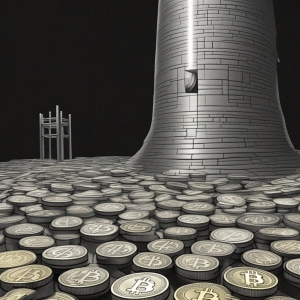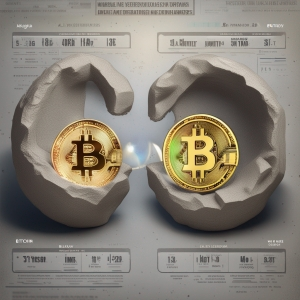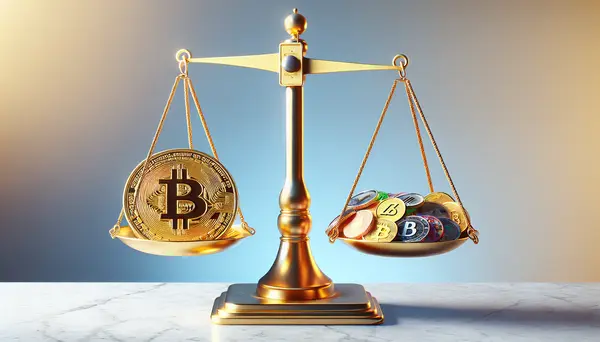Table of Contents:
Introduction: Understanding Bitcoin and Altcoins
Embarking on the journey to financial enlightenment through the use of cryptocurrencies like Bitcoin and Altcoins can feel like navigating uncharted territory. This article aims to provide you with a simple breakdown of Bitcoin and Altcoins, allowing you to make sense of the sometimes bewildering world of virtual currencies.
Bitcoin, the pioneer of the cryptocurrency world, is often the first point of reference for many when it comes to digital currencies. Its concept and usage have sent shockwaves through financial markets and changed the way we perceive transactions.
The Best Mining Providers at a Glance
» Infinity HashFrom our perspective, currently the best mining provider on the market. With the community concept, you participate in a mining pool completely managed by professionals. A portion of the earnings are used for expansion and maintenance. We've never seen this solved as cleanly anywhere else.
» Hashing24A well-known and established cloud hosting company. With a good entry point and in a good market phase, a good ROI can also be generated with some patience. Unfortunately, we see the durations as a major drawback.
Meanwhile, Altcoins – shorthand for 'alternative coins' – represent the multitude of other cryptocurrencies that have sprung up in Bitcoin's wake. While these digital currencies can operate in much the same way as Bitcoin, they may also incorporate additional or unique features. Altcoins include cryptocurrencies like Ethereum, Litecoin, Ripple, and many others.
So, considering their similarities and differences, the question then arises: should you invest in Bitcoin or Altcoins? Let’s delve a little deeper and explore this topic.
Bitcoin: The Pioneer of Cryptocurrency
When it comes to investing in cryptocurrencies, Bitcoin is often the first that springs to mind. As the inaugural cryptocurrency, it has paved the way for the digital money revolution. Bitcoin is based on a decentralized system known as the blockchain, allowing transactions to be made directly between parties without the need for an intermediary such as a bank.
Bitcoin's initial introduction presented a game-changing concept: a decentralized currency. There is no central authority to regulate or oversee it, making it quite free from governmental interference.
Noteworthy for its scarcity, there will only ever be 21 million Bitcoins in existence, which creates a sense of digital gold. This scarcity mirrors precious metals and can lead to increased value over time, especially in times of financial instability.
Moreover, its widespread recognition and acceptance worldwide make Bitcoin a relatively secure bet in the crypto market and gives investors a sense of security. Multiple platforms support it, and you can use it to purchase goods and services from various businesses globally.
Comparison Table: Bitcoin vs. Altcoins Investment
| Comparison Factors | Bitcoin | Altcoins |
|---|---|---|
| Market Dominance | High | Varies notably between coins |
| Security | High | Depends on specific altcoin |
| Adoption and Acceptance | Widely adopted and accepted | Varies; Not as widely adopted as Bitcoin |
| Potential for High Returns | Lower potential (due to its maturity) | Higher potential (riskier investments) |
| Regulation | Increased regulation | Possibly less regulated |
| Infrastructural Development | Well developed | Would depend on specific altcoin |
Altcoins: A Vast Sea of Opportunities

Apart from Bitcoin, there are thousands of alternative cryptocurrencies, collectively known as Altcoins. These alternatives to Bitcoin have been developed either to improve upon the Bitcoin model or to accomplish different tasks using the blockchain technology. Some popular Altcoins include Ethereum, Ripple, and Litecoin, each with its own unique benefits.
Ethereum for example, while being a currency, is mainly a platform that allows decentralized contracts or apps (DApps) to be built on its network. Ripple, on the other hand, focuses primarily on speed and cost-effectiveness of international transfers. Litecoin, meanwhile known as digital silver, was developed to offer faster transactions and a more scalable platform than Bitcoin.
Altcoins can offer investors the opportunity to diversify their portfolio and potentially benefit from the growth of entire new sectors within the crypto world. Some of these coins have risen dramatically in value in a short period, providing potentially high returns. However, the flip side is they can also be extremely volatile and pose a risk, especially to new investors.
There's also the added challenge of predicting which Altcoins will be successful. With new ones regularly hitting the market and older ones disappearing, it can be difficult to know for sure which coins are a safe bet and which are merely a flash in the pan.
Distinguishing Factors Between Bitcoin and Altcoins
Understanding the differences between Bitcoin and Altcoins is key to making informed investment decisions. One of the primary differences lies in their market capitalization. Bitcoin, being the eldest and most recognized of all cryptocurrencies, has a higher market cap and is considered the gold standard of the digital world. It sets the tone for the crypto market and is known for its stability compared to other coins.
Altcoins, despite having a lower market cap, are not without merit. They offer innovations that Bitcoin does not. For instance, they may offer smart contract functionality, increased privacy, or different consensus algorithms that make them faster or more efficient.
Another distinguishing factor is the level of competition and saturation. While Bitcoin remains one, Altcoins are thousands in number each fighting for a share in the market. This levels of disparity can lead to differences in price volatility, with Altcoins often subject to more drastic price changes. This, in turn, might mean potential for higher returns but also higher risk.
Lastly, investing in Altcoins can often require additional technical knowledge. Different Altcoins can use different underlying technologies or concepts, which means understanding their individual mechanics can be crucial for a secure investment.
Investing in Bitcoin: Strengths and Weaknesses

The decision to invest in Bitcoin hinges on a careful evaluation of its strengths and weaknesses. Let's shed some light on both.
Bitcoin's primary strength lies in its established presence. Being the first mover in the cryptocurrency arena, it commands a huge following and widespread trust. Its decentralization, scarcity and resistance to inflation make it a robust investment, much like gold in the traditional finance world.
Moreover, Bitcoin's simplicity and transparency are additional strengths. Every transaction made is recorded on the public ledger, which means it's audit-proof and leaves no room for corruption or manipulation.
However, Bitcoin is not without its flaws. The very decentralization and lack of regulatory oversight that attract many investors also make the cryptocurrency a bit of a wild west. Price volatility can lead to dramatic shifts in value, which can be nerve-wracking for investors. Likewise, while Bitcoins are finite, their value is influenced heavily by demand which can fluctuate based on market sentiment.
Furthermore, Bitcoin’s technological limitations pose another weakness. Slow transaction speeds and its lack of programmability compared to some Altcoins limit its capabilities. And, although it's the most widely accepted cryptocurrency, Bitcoin's use in daily transactions is not as widespread as traditional currencies.
These weaknesses, however, do not undermine Bitcoin's standing as a game-changing investment. Rather, they serve as a reminder that every investment comes with its own set of risks and rewards.
Investing in Altcoins: Strengths and Weaknesses
Commencing your investment journey into the world of Altcoins can be both exhilarating and intimidating. There are undoubtedly potential advantages, yet there are also risks to consider.
The chief allure for investors of Altcoins is the potential for explosive growth. Some Altcoins have registered astronomical increases in value over parsimonious periods. Their relatively low market caps compared to Bitcoin imply a higher ceiling for possible growth. Moreover, Altcoins also present an opportunity to ride on the wave of budding tech innovations or unique solutions to real-world problems these digital currencies might provide.
More practically, some Altcoins facilitate lower transaction fees compared to Bitcoin, which can be attractive for investors who trade more frequently or in larger quantities. Altcoins like Litecoin and Ripple are renowned for their speed and low transaction costs.
Despite the potentials, it's significant to emphasize the risks involved in Altcoin investment. Their value can be volatile, and their future is anything but certain. Market trends can be unpredictable, leading to quick and drastic fluctuations in an Altcoin's worth. Additionally, since new Altcoins are constantly entering the market, competition is fierce, and an Altcoin that seems promising today may be overtaken by a superior technology tomorrow.
Therefore, when investing in Altcoins, it's essential to conduct thorough research on any prospective investment, understand the technology behind it, the team driving it, and what problem it aims to solve. Investors should also be ready to withstand potentially significant short-term losses.
Key Considerations When Choosing Between Bitcoin and Altcoins

When contemplating whether to invest in Bitcoin or Altcoins, several significant aspects demand your attention. Here's a breakdown of the key elements to highlight:
Market Reputation: Bitcoin, as the most recognized digital currency, enjoys more trust and security. On the contrary, altcoins tend to have less established reputations. However, certain established altcoins like Ethereum, Ripple, or Litecoin maintain robust reputations.
Risk Tolerance: Bitcoin is perceived as less risky compared to altcoins due to its dominance, widespread acceptance, and more stable price. If you have a lower risk tolerance, Bitcoin might be a better choice. Conversely, if a higher risk comes with a potentially higher reward appeals to you, altcoin investments could be worth considering.
Investment Goals: If your goal is to engage in cryptocurrency as a quick high-returns gamble, newer, low-cost altcoins might meet this target. If you prefer steady, long-term growth, the dependency might fall more on Bitcoin.
Diversification: Investing in altcoins can provide an opportunity to diversify your investment portfolio. This can help to manage risk, though it also requires careful research and management.
Tech or Infrastructure Diversification: Different altcoins use various technologies and focus on various use cases. If you want exposure to a specific technology area or sector, certain altcoins may provide this.
It's important to remember, cryptocurrency investments, just like any investment, come with risks. An informed decision requires in-depth research and an understanding of your financial goals and risk tolerance.
Conclusion: Your Investment, Your Choice
In conclusion, the choice between investing in Bitcoin or Altcoins depends largely on your risk tolerance and investment goals. Bitcoin, with its global recognition and stability, can be perceived as a safe, albeit slower-growing investment. It's a widely accepted form of digital currency that has proven itself over the past decade.
On the other hand, Altcoins, while riskier, offer the chance of higher short-term gains due to their volatility and innovation. They represent an opportunity to invest in novel technology solutions that could shape the digital landscape of the future.
Regardless of what you choose, remember that informed decisions come from research and understanding. Always be sure to do your due diligence before investing in any type of asset, whether it's Bitcoin, an Altcoin, or anything else. Realize that while the rewards can be significant, so too can be the losses.
As always, it's recommended to seek out expert advice when necessary and consider your own financial situation carefully. Remember, successful investing isn't about making perfect decisions; it's about making informed ones.
Guide to Investing: Bitcoin vs. Altcoins
What is the difference between Bitcoin and altcoins?
Bitcoin is the first and most known cryptocurrency, while altcoins (alternative coins) are all other cryptocurrencies after it like Ethereum, Ripple, Litecoin etc.
What are the risks of investing in altcoins compared to Bitcoin?
While Bitcoin is more stable and less risky, altcoins have greater potential for growth but also for loss. Some altcoins may become worthless.
Is it possible to invest in both Bitcoin and altcoins?
Yes, diversifying your crypto portfolio by investing in both Bitcoin and altcoins can spread the risk and potential growth.
What is the potential for returns between Bitcoin and altcoins?
While Bitcoin has shown steady growth, altcoins can potentially provide higher returns due to their lower market cap and higher volatility. However, this also comes with higher risks.
How do I choose between investing in Bitcoin or altcoins?
Your decision should be based on your risk tolerance, investment goals, and understanding of the individual cryptocurrencies.









